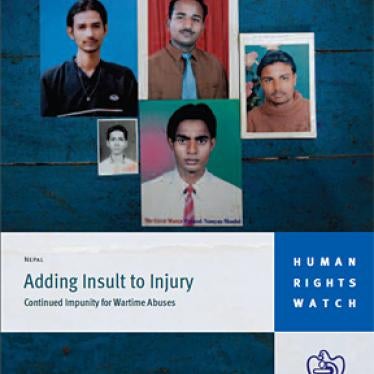(Kathmandu) – The government of Nepal should take immediate steps, with the full cooperation of the Nepal Army, to ensure truth, reparation, and justice for human rights abuses during the country’s decade long conflict, Advocacy Forum and Human Rights Watch said today. The organizations called on the Nepal government, eight years after the still-unpunished torture and killing of 15-year-old Maina Sunuwar, to take immediate steps to end the deepening trend of impunity in Nepal.
Those accused of serious human rights violations have been shielded by the army and the government for many years. Successive Nepali governments have repeatedly expressed a commitment to address impunity, but it is high time this public commitment is put into practice, the organizations said. The government should, without delay, ensure speedy, open and effective investigations and prosecutions of conflict-related human right abuses in civilian courts, and ensure that court orders are carried out.
Proposed bills to establish Truth and Reconciliation and Disappearances Commissions are problematic because of pressure to include provisions granting blanket amnesty to perpetrators of human rights violations committed during the civil war, which ended in 2006. It is not clear which crimes may be subjected to amnesty, as the bills are currently under consideration by the legislative committee of the Constituent Assembly. However, the government needs to ensure reconciliation processes are consistent with Nepal's international human rights obligations, and granting amnesty for serious human rights violations would constitute a breach of these obligations, the organizations said.
During the conflict, government forces detained, interrogated, and tortured Sunuwar. A court martial found that she had died in army custody. Despite repeated orders, those identified as responsible have never appeared before civilian courts.
The United Nations returned Major Niranjan Basnet, who is one of four charged with her murder by the Kavre District Court, from his peacekeeping duties in Chad to answer these charges in December 2009. He has yet to be turned over to the police by the army and has failed to appear in court when served with a summons to do so.
The organizations have repeatedly expressed their solidarity with Sunuwar’s family as well as with other families who have been victims of human rights abuses during the conflict. In Sunuwar’s case, the organizations call on the Nepali authorities to immediately submit Major Basnet to the authority of the Kavre District Court and to arrest Babi Khatri, Sunil Prasad Adhikari, and Amit Pun, all of whom have been implicated by a military tribunal in her death and have charges pending against them. As with many cases of crimes committed during the armed conflict, the delay suggests that the realization of victims' right to a judicial remedy for serious crimes remains a distant dream in Nepal, the groups said.
This pattern of obstruction and non-compliance by the military and other groups is not limited to Sunuwar’s case, the groups said. The Maoists, the former rebels who now lead the government, defy court orders in cases involving their leaders. These include cases of those implicated in the killings of Arjun Lama, Ram Hari Shrestha, and most recently the conviction, upheld by the Supreme Court, of Bal Krishna Dhungel, a member of the Constituent Assembly who remains free despite his conviction.
This wilful obstruction of justice by state security forces and the Maoist-led administration constitutes a serious threat to the rule of law and undermines the credibility and independence of the judiciary, the organizations said. It also suggests that talk of reconciliation and transitional justice are cynical populist gestures, and that victims will continue to wait in vain for justice.






